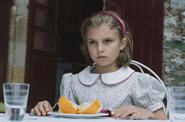Each day, a divorced, middle-aged dance hall chanteur, Alain Moreau (in an elegant performance by Gérard Depardieu), attired in his white satin suit and sporting a provincial, stylishly overgrown haircut with a touch of highlights, sings from his stout repertoire of familiar – yet not too iconic – love songs before an appreciative audience in […]
Tag: Rendez-vous with French Cinema
Blame It On Fidel, 2006
It perhaps comes as no surprise that the astute social observation and political acuity so integral to the wry, infectious, and irresistible whimsical humor of Blame it on Fidel comes from first (non documentary) feature filmmaker Julie Gavras, whose father, Costa Gavras, continues to redefine the bounds of political filmmaking with his distinctive blueprint for […]
Eden Is West, 2009
The quixotic search for a better life in the West collides with the reality of immigration raids, exploitation, and poverty in Costa-Gavras’s picaresque, if insubstantial and ultimately unremarkable film, Eden Is West. Embodying the prototypical image of the naïve, wide-eyed immigrant is Elias (Riccardo Scamarcio) who, as the film begins, has paid smugglers a substantial […]
Love Songs, 2007
Christophe Honoré’s idiosyncratic concoction of irreverent humor, subverted expectation, romanticism, and affectionate homage falls elegantly and poignantly into place in Love Songs (Les Chansons d’amour): a lyrical, immediately engaging, yet substantive thirteen song musical presented in three chapters, each bearing a title from the three parts of Jacques Demy’s The Umbrellas of Cherbourg (Departure, Absence, […]
All Is Forgiven, 2007
Originally produced by Humbert Balsan before his death in 2005, Mia Hansen-Løve’s All Is Forgiven (Tout est pardonné) recalls the muted, slow brewing, slice of life implosions of Stefan Krohmer’s Summer 04 and Valeska Grisebach’s Longing, as well as the naturalistic, organic narrative and chance intersections of Barbara Albert’s cinema to create a raw and […]
Ne quittez pas!/Local Call, 2004
During the Q&A for Local Call, filmmaker Arthur Joffé expressed his great fondness and respect for the works of Nobel laureate author and playwright, Isaac Bashevis Singer, whom he credits as his primary screenwriting influence, and from the complex tragicomic, impassioned, affecting, and deeply humanist tone of the film, the affinity is easy to see. […]





